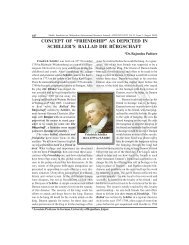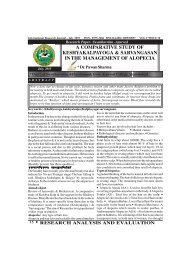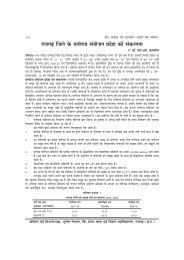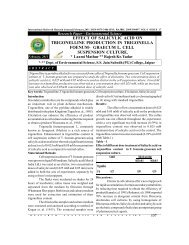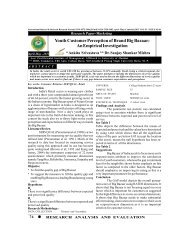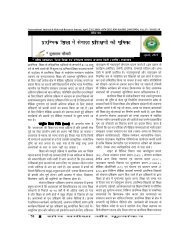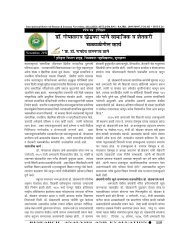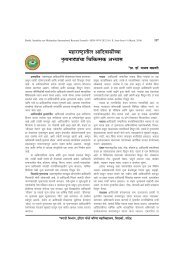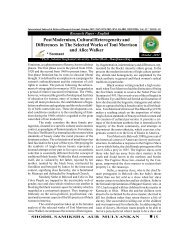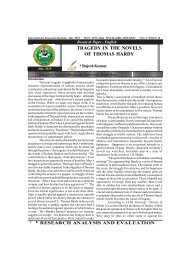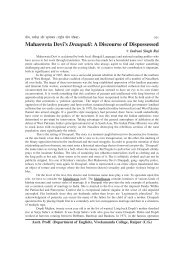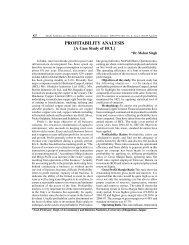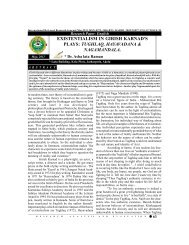Use of Realism in Mulk Raj Anand's Novels - international indexed ...
Use of Realism in Mulk Raj Anand's Novels - international indexed ...
Use of Realism in Mulk Raj Anand's Novels - international indexed ...
You also want an ePaper? Increase the reach of your titles
YUMPU automatically turns print PDFs into web optimized ePapers that Google loves.
International Referred Research Journal, January, 2012, ISSN- 0975-3486, RNI : RAJBIL 2009/30097, VOL- III * ISSUE 28<br />
Research Paper—English<br />
January, 2012<br />
<strong>Mulk</strong> <strong>Raj</strong> Anand stands <strong>in</strong> the front l<strong>in</strong>e <strong>of</strong> Indian<br />
Writ<strong>in</strong>g <strong>in</strong> English. His depiction <strong>of</strong> character is life<br />
like and he is the perfectionist ii the representation <strong>of</strong><br />
his characters. He is undoubtedly the greatest artist <strong>of</strong><br />
Indian Writ<strong>in</strong>g <strong>in</strong> English. His great works represent<br />
to us the lives <strong>of</strong> India's poor <strong>in</strong> a realistic and sympathetic<br />
manner. <strong>Mulk</strong> <strong>Raj</strong> <strong>Anand's</strong> debut novel Untouchable<br />
the great blend <strong>in</strong> literature. Untouchable<br />
novel depicts the events <strong>of</strong> a s<strong>in</strong>gle day <strong>in</strong> the life <strong>of</strong><br />
Bakha.. Bakha, throughout the novel faced the discrim<strong>in</strong>ation<br />
<strong>in</strong> the caste- based so called society. He<br />
belongs to the sweeper community.<br />
He has a great physique and muscles. "Each<br />
muscle <strong>of</strong> body, had as a rock when it came to play,<br />
seemed to sh<strong>in</strong>e forth like glass. What a dexterous<br />
workman! The on looker would have said. And though<br />
his job was dirty, he rema<strong>in</strong>ed comparatively clean"<br />
(Untouchable) He has to clean toilets and br<strong>in</strong>g about<br />
sanitation at the cost <strong>of</strong> his hygiene. Every now and<br />
then he is disparaged and called "defiled and polluted".<br />
He is only a beast <strong>of</strong> burden <strong>in</strong> his eyes <strong>of</strong> the<br />
highly prejudiced so called society. His sister has also<br />
to work <strong>in</strong> the houses <strong>of</strong> the touchables for chores and<br />
returns humiliated. In utter desperation and exasperation,<br />
he tells his father "They th<strong>in</strong>k we are dirt because<br />
we clean their dirt"(Untouchable). The so called society<br />
is not even considerate to him if he <strong>of</strong>fers a help<strong>in</strong>g<br />
hand to it. On the occasion, Bakha is play<strong>in</strong>g hockey.<br />
A little boy is <strong>in</strong>jured and as Bakha lifts the boy up,<br />
boy's caste-ridden mother screams "Polluted, polluted"<br />
(Untouchable) There are many occasions <strong>in</strong> the novel<br />
which reveal the harsh and pa<strong>in</strong>ful realities <strong>in</strong> the<br />
society. On such occasion is when the untouchables<br />
are victimized, and shattered <strong>in</strong>to pieces. The "Well<br />
Incident", "Temple Incident", "bazar <strong>in</strong>cident" and<br />
many other <strong>in</strong>cidents describe how these ill-feted people<br />
are exploited by the so called highclass touchables.<br />
The cruelty doesn't happen only with him but his sister<br />
also faces the same th<strong>in</strong>g just because be<strong>in</strong>g an<br />
untouchable. So, here we can see the untouchables,<br />
be<strong>in</strong>g weak, have no justice. The priest <strong>in</strong> the novel<br />
pollutes his postion, who is supposed to preach the<br />
gospel <strong>of</strong> truth, humanity, morality, and sanctity. But,<br />
he turns out to be a victimizer, a tyrant. On many<br />
occasion Bakha and his family are subjected to <strong>in</strong>hu-<br />
100<br />
<strong>Use</strong> <strong>of</strong> <strong>Realism</strong> <strong>in</strong> <strong>Mulk</strong> <strong>Raj</strong> <strong>Anand's</strong> <strong>Novels</strong><br />
* Karan Sharma<br />
* Asst. Pr<strong>of</strong>. Dept. <strong>of</strong> English, Public College, Samana<br />
mane treatment. The 'Bazar Incident' is also very touch<strong>in</strong>g<br />
and pathetic. He has to face <strong>in</strong>sult through out the<br />
novel , it's just because <strong>of</strong> his untouchability. His only<br />
crime is that he touches people from the caste H<strong>in</strong>du.<br />
For it, he is ill-treated by the so called touchables <strong>in</strong> the<br />
words- 'sw<strong>in</strong>e dog' , 'dirty dog' , 'you brute'. Bakha is<br />
unable to do anyth<strong>in</strong>g despite to listen and bend down<br />
his head, mumbl<strong>in</strong>g someth<strong>in</strong>g. As the same, 'Temple-<br />
Incident' is also pa<strong>in</strong>ful and arises our sympathy for the<br />
sufferer. Bakha is also a common be<strong>in</strong>g like many<br />
others <strong>in</strong> the society but his feel<strong>in</strong>gs are repressed by<br />
this so called touchable society. He is one <strong>of</strong> many<br />
unlucky ones whose life is pa<strong>in</strong>ful and undergo humiliation<br />
just because <strong>of</strong> their be<strong>in</strong>g untouchables <strong>in</strong><br />
the society. These untouchables f<strong>in</strong>d them self no where<br />
<strong>in</strong> the society and spend life full <strong>of</strong> pa<strong>in</strong> even today <strong>in</strong><br />
this world.<br />
"Though the Indian constitution has<br />
made it a crime to practice untouchability, there are<br />
still 60 million people <strong>in</strong> India who are discrim<strong>in</strong>ated"<br />
(Saroj Cowasjee). We can f<strong>in</strong>d a great clash between<br />
the established caste system <strong>in</strong> the various novel <strong>of</strong><br />
Anand, which is always the ma<strong>in</strong> theme <strong>in</strong> his works.<br />
His ma<strong>in</strong> themes are deeply rooted <strong>in</strong> the social conditions<br />
<strong>of</strong> his time. Indian caste-based society is the major<br />
concern, and his characters, represent the most pattern<br />
<strong>of</strong> Indian society. He represents a society charged with<br />
the evils <strong>of</strong> untouchability, caste discrim<strong>in</strong>ation, and<br />
social <strong>in</strong>justice. Anand is a great writer hav<strong>in</strong>g a<br />
sympathetical angle for the untouchables, the outcastes<br />
<strong>in</strong> the society. He is the greatest realist, whose realism<br />
dist<strong>in</strong>guishes him any wrong bias, and has the ability<br />
to take a balanced view <strong>of</strong> man and society. Anand<br />
voices the most fundamental sentiments <strong>of</strong> a man whose<br />
life is a strange amalgam <strong>of</strong> helplessness, anger, protest,<br />
despair and anxiety. The typical Indian lives and<br />
life on many layers each <strong>of</strong> which is <strong>in</strong>extricably l<strong>in</strong>ked<br />
up with others. The caste system is one such layer and<br />
it is a very vital th<strong>in</strong>g for him. He can not help it, so<br />
<strong>in</strong>gra<strong>in</strong>ed it is <strong>in</strong> him, and yet he is a victim <strong>of</strong> it. <strong>Mulk</strong><br />
<strong>Raj</strong> <strong>Anand's</strong> realism lies <strong>in</strong> the depiction <strong>of</strong> a society <strong>in</strong><br />
which the caste factor operates so easily and naturally,<br />
conditions everyth<strong>in</strong>g so effortlessly, that <strong>of</strong>ten it ceases<br />
to be an issue even; it simply rema<strong>in</strong>s as backwater. In<br />
his realistic portrayal <strong>of</strong> the novel Untouchable, caste<br />
RESEARCH ANALYSIS AND EVALUATION
International Referred Research Journal, January, 2012, ISSN- 0975-3486, RNI : RAJBIL 2009/30097, VOL- III * ISSUE 28<br />
is the prom<strong>in</strong>ent theme and he is concerned with the<br />
suffer<strong>in</strong>gs <strong>of</strong> the masses i.e. Shudra- sweepers and his<br />
wish to br<strong>in</strong>g about social happ<strong>in</strong>ess <strong>in</strong> their lives and<br />
to register his protest aga<strong>in</strong>st the evil <strong>in</strong> the social<br />
system <strong>of</strong> H<strong>in</strong>dus as well, whereas Coolie is about the<br />
new caste system, the economic 'classes' be<strong>in</strong>g so rigid<br />
as to be almost 'closed'. Two Leaves and a Bud represents<br />
the pa<strong>in</strong> <strong>of</strong> poor Indians, who suffer <strong>in</strong> the hands<br />
<strong>of</strong> the British, but the Indian life it represents is based<br />
on the caste and community. Anand wrote these novels<br />
<strong>in</strong> the phase <strong>of</strong> his career when caste system was on the<br />
peak <strong>in</strong> India and he was aware enough to raise his <strong>in</strong><br />
protest. Anand himself accepts:<br />
"From tha time onwards my protest about the human<br />
predicament, under the empire and <strong>in</strong> the atmosphere<br />
<strong>of</strong> our own decay, <strong>of</strong>ten result<strong>in</strong>g from bl<strong>in</strong>d acceptance<br />
<strong>of</strong> bad habits and the taboos <strong>of</strong> the sage Manu<br />
and the Hadith tradition <strong>of</strong> Islam, beceme selfconscious….In<br />
a way I sensed the pa<strong>in</strong> <strong>of</strong> l<strong>of</strong>e, which<br />
the more privileged took out <strong>of</strong> the weaker member <strong>of</strong><br />
the flock"( Anand)<br />
In the realist depiction <strong>of</strong> the Indian<br />
society, he has presented to us a class <strong>of</strong> those people<br />
whose social status is dom<strong>in</strong>ated by their economic<br />
status. In his masterpiece Untouchable the status is<br />
determ<strong>in</strong>ed by birth, whereas <strong>in</strong> one <strong>of</strong> another his<br />
novel Coolie it determ<strong>in</strong>es by an economic group. If<br />
we talk about the theme, Coolie <strong>of</strong> Anand is just extension<br />
<strong>of</strong> Untouchable, Anand depicts the social evil that<br />
has run its impact even <strong>in</strong> Indian history. A strong<br />
believer <strong>in</strong> the dignity and the equality, Anand is naturally<br />
shocked at the <strong>in</strong>human way the untouchables<br />
and coolies are treated by those belong to the superior<br />
caste. Whereas Anand tells about a s<strong>in</strong>gle community<br />
<strong>in</strong> his novel untouchables, but it also implies <strong>in</strong> the rest<br />
<strong>of</strong> the world, where we have caste-based society. Where<br />
we have discrim<strong>in</strong>ation on the name <strong>of</strong> class, race. His<br />
representation <strong>of</strong> social structure reflects his idea to<br />
R E F E R E N C E<br />
revolt aga<strong>in</strong>st for exploitators to change their <strong>in</strong>human<br />
behaviour with the rest <strong>of</strong> the world, and also to<br />
uplift their behaviour <strong>in</strong> the society. In the words <strong>of</strong><br />
K.R.S. Iyenger, his works "not only a representation<br />
<strong>of</strong> social reality, but also a necessary functional part <strong>of</strong><br />
social control, and also, paradoxically, an important<br />
element <strong>in</strong> social change"<br />
<strong>Mulk</strong> <strong>Raj</strong> Anand is the greatest writer<br />
<strong>of</strong> downtrodden because <strong>of</strong> his realistic portrayal <strong>of</strong><br />
Indian society, which <strong>in</strong>cludes the social values and<br />
social harmony. Anand believes that man is the creator<br />
<strong>of</strong> his own dest<strong>in</strong>y. He has immense faith <strong>in</strong> man and<br />
his power. Be<strong>in</strong>g a great artist, Anand does speak about<br />
black and white, but he gives the artistic form to the<br />
tragic experience <strong>of</strong> a man. <strong>Anand's</strong> revolt and warn<strong>in</strong>g<br />
lies with<strong>in</strong> the presentation <strong>of</strong> his art. About the<br />
novels <strong>of</strong> Anand, Iyanger says that they came "fresh<br />
from contact with flesh and blood <strong>of</strong> everyday existence".<br />
We f<strong>in</strong>d no discrim<strong>in</strong>ation based on race and<br />
caste <strong>in</strong> our constitution, but <strong>in</strong> practical life these all<br />
aspects still exist <strong>in</strong> our society. Social discrim<strong>in</strong>ation<br />
still prevails this way or that way and, therefore, social<br />
exclusion and exploitation <strong>of</strong> the lower class <strong>of</strong> the<br />
society, though their form and proportion might be<br />
different from the cases <strong>of</strong> pre-<strong>in</strong>dependence era. K.R<br />
Shr<strong>in</strong>ivas Iyenger also confirms this, "….the problem<br />
with blunted edges, perhaps, and also with some reliev<strong>in</strong>g<br />
features here- still defies a firm and f<strong>in</strong>al solution!"<br />
Despite <strong>of</strong> that <strong>Anand's</strong> novels considered as the<br />
blend to change the social system so that the untouchables<br />
can enjoy the equal freedom <strong>in</strong> the society. Anand<br />
dreamt for our strong, united, prosperous and peaceful<br />
nation. Through his great works he has presented to us<br />
the pa<strong>in</strong>ful realistic picture <strong>of</strong> our so called Indian<br />
society <strong>in</strong> a great manner, now he has left on us to th<strong>in</strong>k<br />
how we can change the prevail<strong>in</strong>g system, and how<br />
can we make our nation more prgressive.<br />
<strong>Mulk</strong> <strong>Raj</strong> Anand, Untouchable, New Delhi: Orient Paperbacks, 1970 <strong>Mulk</strong> <strong>Raj</strong> Anand, "The Source <strong>of</strong> Protest <strong>in</strong> my <strong>Novels</strong>" <strong>in</strong> The Indian<br />
Novel with a Social Purpose ed. By K. Venkata Reddy, New Delhi: Atlantic Publishers and Distributors, 1999, pp. 20-21 K.R.S. Iyenger, Indian<br />
Writ<strong>in</strong>g <strong>in</strong> English, New Delhi: Sterl<strong>in</strong>g Publishers, 1984, p.338-39. <strong>Mulk</strong> <strong>Raj</strong> Anand, "The Source <strong>of</strong> Protest <strong>in</strong> my <strong>Novels</strong>", op. cit., p.29<br />
<strong>Mulk</strong> <strong>Raj</strong> Anand: Coolie. 1936. London: Pengu<strong>in</strong>, 1986 Saroj Cowasjee: Author and critic: The letter <strong>of</strong> <strong>Mulk</strong> <strong>Raj</strong> Anand (Writers Workshop<br />
Publication).<br />
RESEARCH ANALYSIS AND EVALUATION 101



